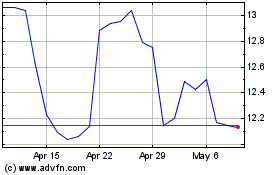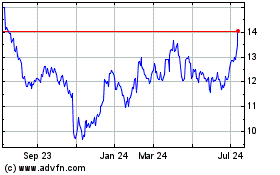By William Boston and Mike Colias
BERLIN -- Ford Motor Co. detailed plans to close factories in
Europe and cut 12,000 jobs, or more than 20% of the company's
workforce there, an effort to return to a profit in the region and
focus on technologies that are reshaping the auto industry.
The moves are part of a revamp of Ford's unprofitable European
operations announced in January and a broader cost-cutting effort
as the company pivots toward electric vehicles and autonomous
driving. Ford said it would cut its European manufacturing
footprint to 18 plants from 24 by the end of 2020.
As part of the overhaul in Europe, where auto makers are
struggling with sluggish consumer demand after years of growth, the
company aims to focus more on imported passenger cars and locally
built, higher-margin commercial vehicles.
The move is the latest example of a big U.S. car maker
retreating from Europe, which has high labor costs and is in the
process of adopting some of the strictest emissions regimes in the
world.
Ford and rival General Motors Co. for decades expanded their
factory footprints and built sales forces across far-flung regions
to build scale in a capital-intensive business. But in recent years
each has trimmed its global presence, redirecting investment to
their strengths, namely truck and sport-utility vehicles.
Ford shares rose nearly 3% in morning trading Thursday. Shares
have rallied 33% this year amid an emerging view among some
investors that Chief Executive Jim Hackett's turnaround plan is
beginning to gain traction.
Mr. Hackett has been under pressure from analysts who have
questioned whether he is moving quickly enough to boost
profitability. The company has outlined recent restructuring moves
globally that have soothed investors. The auto maker last month
said it is cutting 7,000 salaried positions and it is overhauling
its money-losing South America business.
Mr. Hackett still has a long road to recovery, though. Ford lost
money in each of its overseas businesses last year, including a
$1.5 billion loss in China, where the company had until recently
been profitable. Mr. Hackett recently installed a new management
team in China to lead the turnaround effort there.
The announcement in Europe adds key details to several
statements that Ford has made since unveiling plans for a global
restructuring last October. In January, Ford said the job cuts
would hit a "significant number of the 50,000 we employ" in Europe,
as it aimed to turn European losses into a 6% profit margin in the
next few years. Ford has since unveiled plans for deep cuts in
Germany, France, the U.K. and Russia.
"The cuts are very broad-based," Stuart Rowley, president of
Ford's European business, told reporters on a conference call.
"Ford will be a more targeted business in Europe, consistent with
the company's global redesign, generating higher returns through
our focus on customer needs and a lean structure."
The overhaul comes as the industry is under pressure from
demands by European regulators to meet tougher greenhouse-gas
emissions limits next year, waning demand as European car sales are
expected to fall for the first time in six years, and uncertainty
amid global trade tensions and a slowing economy.
The company said stepped-up imports would consist of "a niche
portfolio of iconic passenger vehicles" that would include the
Mustang, the Explorer and a new fully electric sport-utility
vehicle.
"Ford's plan may be more comprehensive than appears at first
blush," Bank of America analyst John Murphy wrote in a research
note last month, when he raised his rating on Ford shares to a
buy.
GM exited Europe in 2017 by selling its business to French car
maker PSA Group, citing the toughening regulatory environment and
its own middling position in Europe. GM has said that it wants to
compete only in markets where it can be a top-two player, leaving
it focused on North America, China and South America.
Ford is No. 6 by sales in Europe, with a 6.3% market share this
year through May. The strategy outlined Thursday is focused more on
boosting profitability than lifting sales volume. Its
commercial-van business in Europe is 14% with "great
profitability," Ford strategy chief Jim Farley told analysts
earlier this year.
The reduction in European manufacturing will result in the loss
of around 5,000 jobs in Germany, and 3,000 in the U.K., more than
2,000 in Russia and nearly 1,000 through the closure of a plant in
the Bordeaux region of France.
Ford has about 51,000 employees in Europe, and almost 200,000
world-wide as of last year.
Ford has struggled to generate consistent profits in Europe for
years. In addition to the streamlining of its European business,
Ford and Volkswagen AG recently said they would create an alliance
to produce light commercial vehicles. Mr. Rowley said the talks,
which are expected to conclude soon, were on track. He declined to
elaborate.
In addition, Ford has been negotiating with local trade unions,
which have more say over such restructuring measures than labor
representatives in the U.S., about a number of plant closures.
Ford has also agreed to sell its Kechnec transmission plant in
Slovakia to Magna International Inc., an automotive supplier.
Those talks have now been concluded and Mr. Rowley said the bulk
of the job cuts would be completed by the end of next year.
--Nathan Allen contributed to this article.
Write to William Boston at william.boston@wsj.com and Mike
Colias at Mike.Colias@wsj.com
(END) Dow Jones Newswires
June 27, 2019 11:39 ET (15:39 GMT)
Copyright (c) 2019 Dow Jones & Company, Inc.
Ford Motor (NYSE:F)
Historical Stock Chart
From Mar 2024 to Apr 2024

Ford Motor (NYSE:F)
Historical Stock Chart
From Apr 2023 to Apr 2024
